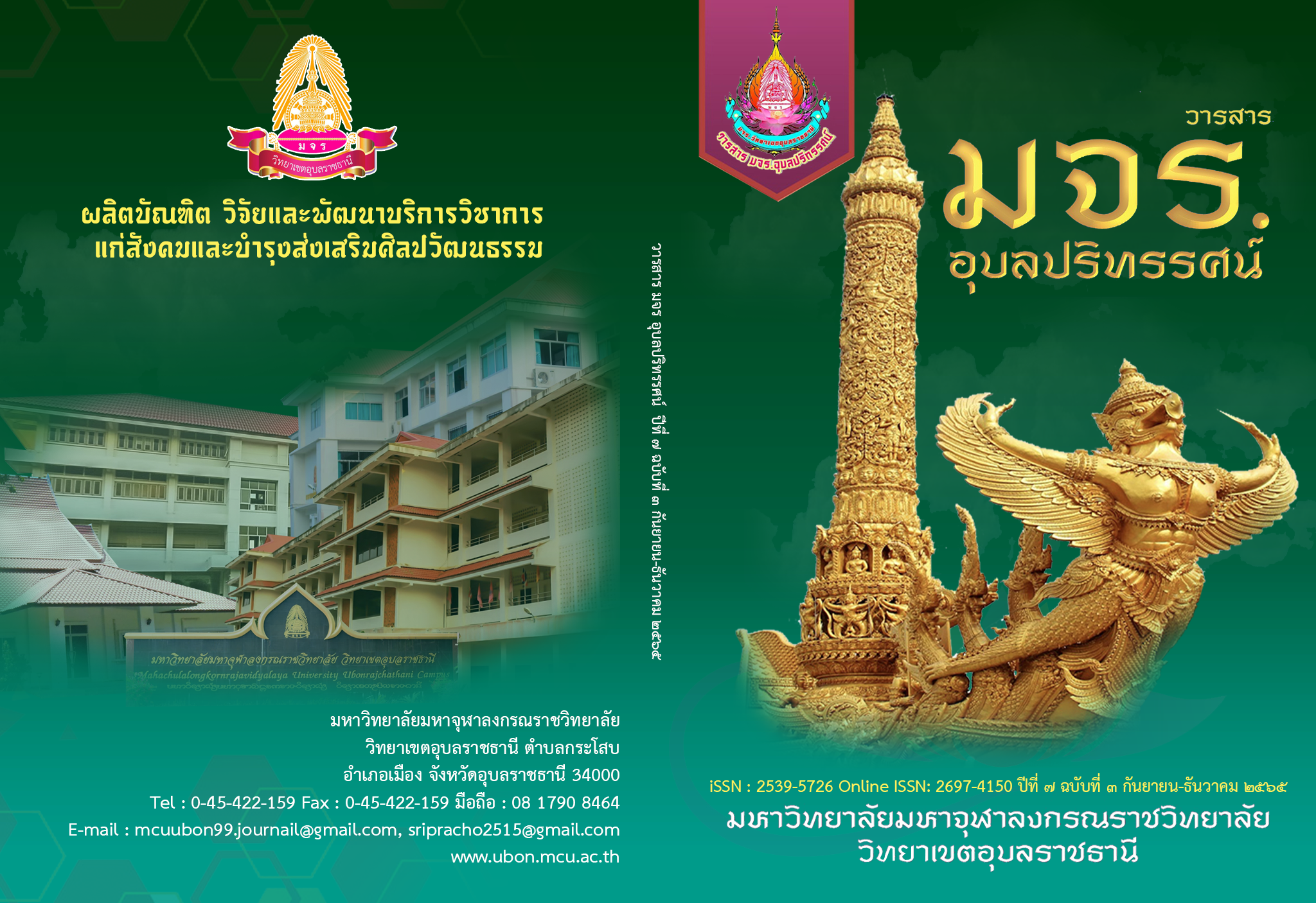UNDERGRADUATE STUDENTS’ SELF-DIRECTED LEADERSHIP FOR THEIR ONLINE LEARNING DURING THE COVID-19 PANDEMIC OUTBREAKS IN THAILAND
Main Article Content
บทคัดย่อ
This study focused on the undergraduate students’ self-directed leadership for their online learning during the Covid-19 Pandemic Outbreaks in Thailand. It aimed to investigate the level of the undergraduate students’ self-directed leadership for their online learning in the selected universities, Thailand; to compare the undergraduate students’ self-directed leadership for their online learning according to their gender and university type; and to compare the undergraduate students’ self-directed leadership for their online learning according to their grade levels, in the selected universities, Thailand. The study took all the undergraduate students from two universities in Thailand. A total of 7393 undergraduate students were used as the population for this study. The Self-directed Leadership Questionnaire for Online Learning sent in a google form way to the sample students, finally 279 valid questionnaires were analyzed. The major findings included the overall level of undergraduate students’ self-directed leadership in the selected universities was regarded as “high”, however, the levels of students’ self-talk, self-punishment, self-observations, and self-cueing were “moderate” still. There was a significant difference of undergraduate students’ self-directed leadership for their online learning based on their gender, and grade level, but no significant difference based on university type.
Article Details
เอกสารอ้างอิง
Albertina, L.O.& António, S. (2006), Impact of Sociodemographic and Psychological Variables on the Self-Directedness of Higher Education Students,
International Journal of Self-Directed Learning, 3(1), 1-13
Alves, J. C., Lovelace, K. J., Manz, C. C., Matsypura, D., Toyasaki, F., & Ke, K. G.(2006). A cross-cultural perspective of self-leadership. Journal of Managerial Psychology, 21(4),338-359.
Amundsen, S., & Martinsen, L. (2015). Linking empowering leadership to job satisfaction,work effort, and creativity: The role of self-leadership and psychological empowerment. Journal of Leadership & Organizational Studies, 22(3), 304-323
Bandura, A. (1999). A social cognitive theory of personality. In L. Pervin & O. John
Handbook of personality. New York, Guildford Publications. Psychological review 106(4), 676.
Bandura, A. (2004). Health promotion by social cognitive means. Health Education & Behavior, 31(2), 143.
Bandura, A. (2006). Toward a psychology of human agency. Perspectives on Psychological Science, 1(2), 164.
Betz, N. E. (2007). Career self-efficacy: Exemplary recent research and emerging
directions. Journal of Career Assessment, 15(4), 403-422.
Blanchard, K. (2005). Self-Leadership and One Minute Manager. Gramedia Pustaka
Utama.
Brown, K. (2009). Educators jump ship: A study of leadership style and teachers’ job
satisfaction. Retrieved from ProQuest Dissertations and Theses database
Brown, J., Isaacs (2001). The world cafe: living knowledge through conversations that matter. The Systems Thinker, 12(5), 1-5.
Carver, C. S., & Scheier, M. F. (1998). On the self-regulation of behavior. New York: Cambridge University Press.
Danica, B, (2016) Relationship between job satisfaction and organizational performance, Economic Research-Ekonomska Istraživanja, 29(1), 118-130.
Green, M., & Piel, J. A. (2009). Theories of human development: A comparative approach (second ed.): Prentice-Hall, Inc.
Houghton, J. D., & Neck, C. D. (2002). The revised self-leadership questionnaire: testing hierarchical factor structure of self-leadership. Journal of Managerial Psychology, 17(8), 672-691.
Gabrielle, D. M., Lucy M, and Guglielmino, P. J. (2006) Developing Self-directed Learning Readiness of Future Leaders in a Military College Through Instructional Innovation, International Journal of Self-Directed Learning, 3(1), 24-36
Latham, G.P. (2012) Work Motivation: History, theory, research and practice 2nd ed. SAGE Publications: Toronto.
Marco, Pierre and Silvia (2012) Learning to influence yourself: Full range self-leadership training. Journal of the Indian Academy of Applied Psychology July 2012, 38(2), 299-309.
Manz, C.C.(1991). Developing self-leaders through Super Leadership, Supervisory
Management, 36 (9), 3-9.
Muro, M., and P. Jeffrey. (2008). A critical review of the theory and application of social learning in participatory natural resource management processes. Journal of Environmental Planning and Management 51(1), 325-344.
Neck, C.P. (1998). The rest of the self-leadership story, in Dansereau, F. and Yammarino, F.J. (Eds), Leadership: The Multiple-Level Approaches, Classical and New Wave, JAI Press,
Nelissen, R. M. A., & Zeelenberg, M. (2009). When guilt evokes self-punishment: evidence for the existence of a Dobby Effect. Emotion, 9(1), 118–122.
Neubert, M. J., & Wu, J. C. C. (2006). An investigation of the generalizability of the
Houghton and Neck Revised Self‐Leadership Questionnaire to a Chinese
context. Journal of Managerial Psychology, 21(4), 360-373
Paul, L. N (2012). The Role of Self-Reflection, Emotional Management of Feedback, and Self-Regulation Processes in Self-Directed Leadership Development, Human Resources Development Review II (2) 203-226.
Sesen, H., Tabak, A., & Arli, O. (2017). Consequences of self-leadership: A study on
primary school teachers. Educational Sciences: Theory & Practice, 17(3), 23-29.
Stewart, G. L., Courtright, S. H., & Manz, C. C. (2011). Self-leadership: A multilevel
review. Journal of Management, 37(1), 185-222.
Stewart, G. L., Courtright, S. H., & Manz, C. C. (2019). Self-leadership: A
paradoxical core of organizational behavior. Annual Review of Organizational Psychology and Organizational Behavior, 6, 47-67.
Unsworth, K. L., & Mason, C. M. (2012). Help yourself: The mechanisms through
which a self-leadership intervention influences strain. Journal of occupational health psychology, 17(2), 235.
Wang, Y., Xie, G., & Cui, X. (2016). Effects of emotional intelligence and
self-leadership on students’ coping with stress. Social Behavior and Personality: an international journal, 44(5), 853-864


